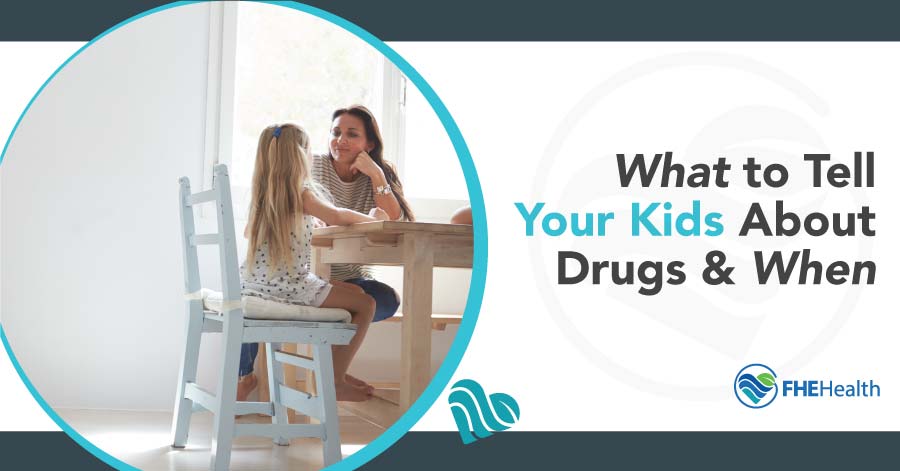
Kids are energetic bundles of joy that make us laugh, cry, and melt our hearts with their unwavering innocence and unfiltered opinions of life. As our children grow, they gain more and more independence with each passing year – even at an early age. Like little sponges, our children regurgitate everything they learn from us and everyone around them. Kids base their decision making on what they see, hear, and what they are told to do. Most of us understand that the actions we take today will affect the future of our children.
It’s no secret that substance abuse is a major epidemic in society today. There is no right or wrong time to begin discussing the consequences of drug and alcohol abuse with your children. Handling the substance abuse crisis begins with prevention by talking to your kids about drugs. Here are some tips on how and when to discuss substance abuse issues with your kids.
Open Communication
First and foremost, you must maintain open lines of communication with your children. Initiating an open dialogue about substance abuse is the most important way for your kids to learn about drugs and alcohol as well as the harm they cause. Talking openly to your kids and maintaining consistent conversations on the matter will reinforce how important the subject is to you.
Educate Your Child
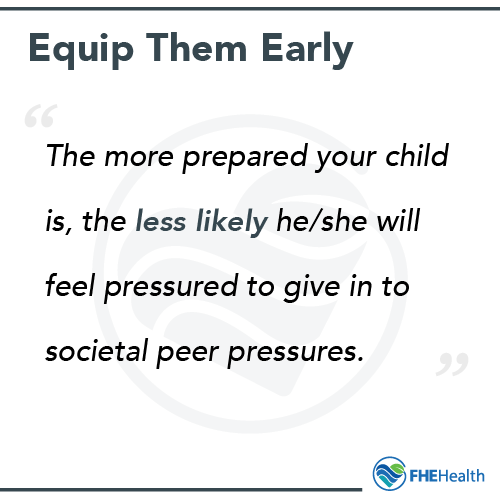 When our children are young, our opinions of “good” or “bad” are critical. More often than not, our children begin to develop a moral code based on what we teach them. We can begin educating our children – at a young age – by explaining which things cause harm and which things are good for their bodies. You can also explain how important it is to keep their bodies healthy because their bodies help them go wherever they need to go.
When our children are young, our opinions of “good” or “bad” are critical. More often than not, our children begin to develop a moral code based on what we teach them. We can begin educating our children – at a young age – by explaining which things cause harm and which things are good for their bodies. You can also explain how important it is to keep their bodies healthy because their bodies help them go wherever they need to go.
As your child gets older you can begin by explaining which things are good for their bodies and what things may make them sick. You can explain how illicit substances or excessive alcohol consumption can be extremely dangerous to them and others around them.
Talking to Your Kids About Drugs: Normalize Conversations
By initiating an open line of communication with your child, you set the tone for the level of comfort your child will have with regard to peer pressure and substance abuse. By letting your child know you are a safe person to come to, to talk about such issues, you are increasing the chances that your child will come to you and tell them what is happening in their lives – good or bad.
As your child reaches early teenage years or middle school, peer pressure increases dramatically. This is a perfect time to start role-playing. By acting out situations they may face – you allow your child to be prepared when substance abuse issues may arise via peer pressure. The more prepared your child is, the less likely he/she will feel pressured to give in to societal peer pressures.
Encourage Your Child to Stick with Winners
As your child begins to gain more independence and begins making new friends, it is important to remember you cannot protect him/her from everything. You have no control over who your child chooses to spend their time with. However, you can encourage your child to interact with other kids that are making good choices. Express the importance of selecting friends that share similar values and beliefs on drugs and alcohol. Let your child know that they can ensure a more successful and promising future if they surround themselves with positive, encouraging friends who share the same anti-drug perspective.
Talk About Social Media and Pop Culture
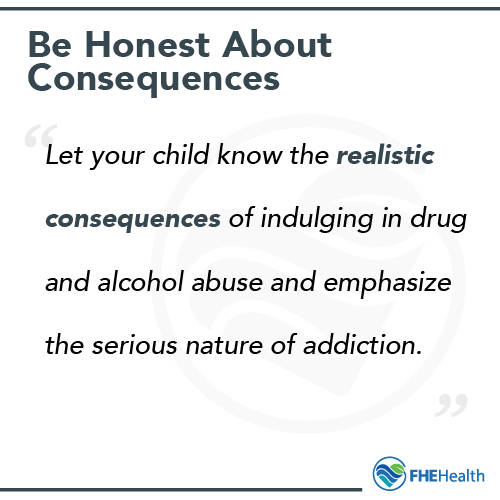 We live in an era in which social media and pop culture influence almost every aspect of our lives. This is especially true for our extremely vulnerable and impressionable children. Research shows that TV, movies, social media, and even commercials tend to glamorize smoking, drinking, and drug use. Discuss the truth about drug and alcohol abuse. Explain to your child that substance abuse is not as romantic and “cool” as it may be portrayed on TV – especially considering social media does not show the other side of substance abuse. Let your child know the realistic consequences of indulging in drug and alcohol abuse and emphasize addiction’s serious nature.
We live in an era in which social media and pop culture influence almost every aspect of our lives. This is especially true for our extremely vulnerable and impressionable children. Research shows that TV, movies, social media, and even commercials tend to glamorize smoking, drinking, and drug use. Discuss the truth about drug and alcohol abuse. Explain to your child that substance abuse is not as romantic and “cool” as it may be portrayed on TV – especially considering social media does not show the other side of substance abuse. Let your child know the realistic consequences of indulging in drug and alcohol abuse and emphasize addiction’s serious nature.
Positive Reinforcements
Part of educating your child is validating and encouraging them to make the right choices. Our children thrive on attention and validation. It is important that you praise your child for what they do right – taking care of their bodies, making good grades, accomplishments in school and sports, and even for remaining drug-free.
What Age Are They Ready?
There is no “right” or “wrong” time to begin discussing drugs, alcohol, and tobacco with your children. However, the conversations must be age-appropriate and relatable for your child. Parents who educate their children appropriately can give their children the proper facts and clarify any misconceptions on substance abuse. You are your child’s greatest influencer. Here are a few age-appropriate tips on how to begin discussing drugs and alcohol with your child.
Preschool to Age 7
Before you get nervous about talking to your kids about drugs or alcohol – take heart – no parent is perfect, and you’ve probably already laid some successful groundwork to begin this open discussion.
- Whenever you give your child fever medication, explain the importance of why and how you administer the medication. Discuss the importance of only taking the medication when he/she is sick and taking the exact amount that is recommended.
- Take advantage of “teachable moments.” When you see a character smoking or drinking alcohol in a movie or on TV – take this time to discuss how these substances affect the body. Allow this to lead into a conversation discussing the dangers of these substances.
- Emphasize the importance of taking care of your child’s health. Explain that our bodies get us to where we need to go. Talk to your child about eating healthy, showering, brushing teeth, etc. In the same conversation, go over the negative consequences of not taking care of their bodies – and correlate this discussion with taking harmful substances and how this may affect their bodies.
Ages 8-12
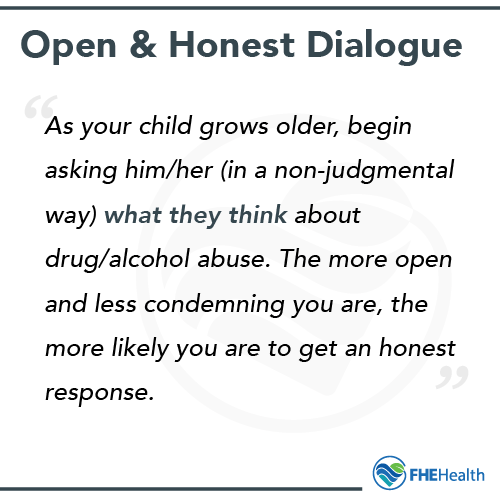 Kids at this age are still bold and willing to discuss and inquire about seemingly touchy subjects. Take full advantage of this vulnerable time and remain calm and transparent with your child.
Kids at this age are still bold and willing to discuss and inquire about seemingly touchy subjects. Take full advantage of this vulnerable time and remain calm and transparent with your child.
- As your child grows older, begin asking him/her (in a non-judgmental way) what they think about drug/alcohol abuse. The more open and less condemning you are, the more likely you are to get an honest response.
- Be sure you are fully attentive and let your child know you are listening to them.
- As your child approaches middle school, it is likely he/she has encountered some conversation regarding drugs/alcohol with friends or at school. It is important you maintain open lines of communication with your child.
- This is a perfect time to begin role-playing and discussing the specific situations in which your child may begin experiencing peer pressure. Educate your child and help them come up with a response if the situation may arise in which drugs/alcohol are present.
Ages 13-17
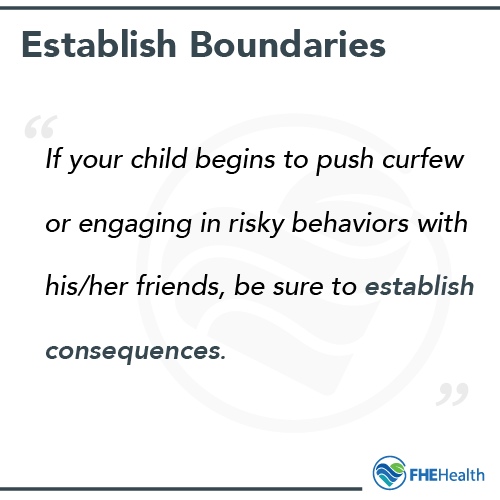 This is the age period in which your child most likely knows someone who has used drugs/alcohol or is currently abusing these substances. As children begin gaining more independence such as obtaining a driver’s license or later curfews – it is vital to establish rules and expectations as well as open communication with your child.
This is the age period in which your child most likely knows someone who has used drugs/alcohol or is currently abusing these substances. As children begin gaining more independence such as obtaining a driver’s license or later curfews – it is vital to establish rules and expectations as well as open communication with your child.
- Your child may be open to discussing situations they have faced surrounding drugs and alcohol. Make sure your child feels safe discussing these topics with you, without condemnation. This is the best way to keep the communication open. Let your child know you are always available to come to pick them up to help them if they face pressure to use drugs or drink alcohol.
- This is a crucial time to begin enforcing expectations and rules within your home. Establish an appropriate curfew and reinforce the rules surrounding a drug-free policy within your home. If your child begins to push curfew or engaging in risky behaviors with his/her friends, be sure to establish consequences.
- This is a perfect time to begin discussing consequences of substance abuse. Discuss potential consequences of drinking and driving, jail, prison, addiction, and potential overdose. It is important you do not just throw extreme consequences without evidence. Show your child statistics and news stories relating to similar situations in which drugs and alcohol are involved.
- Explain that substance abuse can hinder your child’s dreams of getting into the college they are applying to and affect their future lives forever.
- Be sure to remind your child that who he/she spends time with can either encourage a successful life or put them in vulnerable situations in which he/she may be “guilty by association.”
As mentioned before, there is no right or wrong way to discuss drugs and alcohol with your child. Most importantly there are age-appropriate conversations that can open lines of communication with your children. Be sure to praise your child when he/she is making good choices and also make your expectations clear within your household. Most importantly, ensure your child feels comfortable discussing tough conversations with you. No parent, child, or family is immune to the effects of drugs. Any kid can end up in trouble, even those who have made an extensive effort to avoid it and when given the proper guidance.






